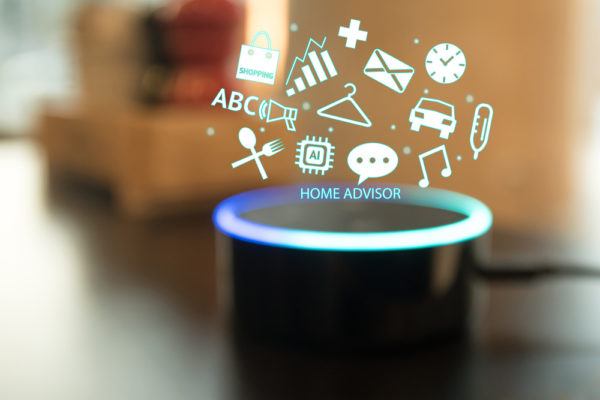
Smart TV’s, Fridges, Children’s Toys, Doorbells, Baby Monitors, gaming consoles and of course the usual computers and phones. So many devices in our homes can now be connected to the internet, but how safe are they, and what do you need to do to secure them?
Smart Speakers
2017 was the year of the Smart Speaker, with the recent release of Amazon Smart Speakers, Google Home Speakers and now Apple Home Pod speaker. These speakers are great for portable music streaming, but are also fun devices to use as home assistants. They can do tasks from controlling lights, air-conditioning, shopping, security and more. Just like your own personal maid or butler.
Are They Safe, Are They Private?
The artificial intelligence or A.I as it is known, in these speakers will learn from your commands and behaviour as time goes by give you the answers to your questions that you are more likely to find useful. They work in much the same way as modern search engines and social media where they learn from our online behaviour what we are likely looking for. How many times have you been discussing a product and then seen it in an advertisement online? You may not have thought you had even searched for that product, but maybe the person you were talking to, did?
Every Device in your home that connects via Wi Fi and has an app, may be also connected to the internet. The interaction between the app and the device may not just work through your local home Wi Fi or through bluetooth. That detail is important to know, because once you have a device in your home that connects to the internet, you need to know how secure it is, and what data about you is being stored online. Read the terms and conditions that come the device, does it share your personal data with other areas of the company or third parties? Connecting to your device via the Wi Fi or Bluetooth without connection to the internet is more secure, and some devices do have that option.
Setting Security Is Essential
Can someone hack into your home smart device, or steal your personal data, which could include voice recordings, video, address details, email addresses and passwords? It is possible if you don’t have security set up on the device or your connected account, or if there is some sort of data breech on the account side. Cloud Pets for example an internet connected Toy was hacked via the stored data online.
Set a good strong unique password when setting up your device if prompted. There may not be an actual password for the device but you may have to sign into the software for the device with an existing online account like your Amazon, Apple, or Google account, it is essential that your online accounts have good unique strong passwords and two factor security, (Apple force this now when setting up your Home Pod). Go to your security settings in your online accounts to see that you have a strong password, and extra security like login alerts or two factor authentication set up. You will then be notified if someone is trying to access your online account from another location. If your device connects to your home internet or Wi Fi, you also need a good strong password on your modem.
Is the Speaker Listening ALL The Time?
The speakers when powered up are clearly listening for a command to start recording and listening. According to the manufacturers these speakers don’t store anything they hear before they hear the trigger word such as “Ok Google” or “Hey Siri” or “Alexa” You can delete voice recordings if you wish to secure your data. For Alexa go to the app Settings/History or “Manage Your Contacts” from your Amazon account on a website. For Google go to myactivity.google.com Click the 3 dots top right and select “Delete Activity By” Select date range or select products and choose “Voice & Audio”. For Siri you need to turn off both ‘Ask Siri’ and ‘Dictation’ through settings from your iOS device, and then switch back on. Apple encrypt all your voice recordings and data so that if your data were hacked it is unreadable, even to Apple, but it doesn’t seem there is an easy way to delete all the history as yet.
Parental Controls
Children are understandably attracted to having a Virtual Assistant or what is known as A.I Artificial Intelligence to ask the thousands of questions that they may have. Finally someone can answer the “Why Is the Sky Blue” style questions that parents have been struggling with for eons.
But there may be a risk to your family having an unfiltered smart device that may transmit adult content. Asking an innocent question of a Smart Speaker and receiving an adult response is the same as not having any adult content filtering on a home computer or smart phone. Some smart devices do have parental controls and some don’t. Some of the services that can be streamed through the speakers, like iTunes and Spotify, can have restrictions put on the content they stream through those accounts. You would need to set parental controls on any device your smart speaker can switch on or off, it it has media on it.
How To Set Parental Controls?
Basically for all internet connected devices find the settings through the online account or controller or app and navigate to restrictions or parental controls. Search online for directions if they are not listed here.
- Smart TV’s Check the devices manual or search for the pdf version of the manual online from the manufacturers website. Explore the settings through your devices controller or app.
- Smart Speakers: Set restrictions on media on the account or device used to set up the speaker. For Google use “Family Link” to link your child’s parental controlled account to Google Home and voice. For Apple use the available settings on your apple account or device. Alexa does not appear to have any parental controls other than a request for a pin code for purchases.
- Apple T.V: Go to settings/General/Restrictions
- Chromecast; Set restrictions on the content that is streamed. i.e Netflix, Apple iTunes, YouTube.
- Fetch T.V: Go to Settings/parental controls or See user guide https://www.fetchtv.com.au/faqs
- Consoles like Xbox, Playstation, Nintendo Switch all come with parental controls. You can restrict messaging, profiles, certain games and in App Purchases. Check the website or manual.
Media streaming services like Netflix and Foxtel also come with parental controlled accounts. The YouTube app on smart TV’s have access to filtering but cannot be locked on with a Pin. For YouTube open on your smart T.V and then Go to the YouTube apps and then Settings and scroll across to Restricted Mode and enable.
Top Tips For Securing Your Smart Home Devices
- Set strong passwords and two factor authentication for all online accounts that may connect to your device like Amazon, Google, iTunes.
- Set strong passwords for your devices, or connected apps for the device. Make the password hard to guess, unrelated to your personal details. Over 8 digits long.
- Set unguessable pin codes on your devices not 0000 or a code that relates to a birth year or date.
- Set a strong password for your Wi Fi router so that it is private. Google how to do this with the name and model of the device if you don’t know.
- Make sure your modem and computers are secure with firewall settings and password protection and up to date anti virus protection.
- Secure your passwords offline in a book in safe location or with a password manager like 1Password or Lastpass
- Don’t give out personal details when setting up your device unless you absolutely have too. Street addresses, phone numbers.
- Rather than use a phone number to set up two factor authentication use an authentication app like Google or Sophos Authenticator.
- Make sure your modem and smart device has up to date software, set it to update automatically if that is available. Check every 6 months or so to see if your device or modem requires a firmware update, this will help with security.
- Delete your data or voice recordings from the cloud from time to time to help with security see above.
Leonie Presents Cyber Safety Talks for schools, business, and community groups.


